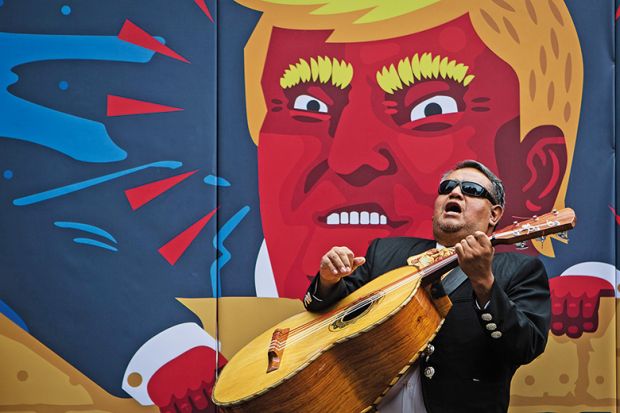Browse the full Emerging Economies University Rankings 2018 results
The arrival of Donald Trump on the political landscape has created an uncertain and unwelcoming climate for Latin American students seeking higher education in the US.
From his initial speech announcing his candidacy for the presidency, in which he disparaged Mexican immigrants, and his campaign promise to build a wall at the Mexico-US border to stem the flow of undocumented immigrants, to his threat to end the North American Free Trade Agreement (Nafta), which has been critical for the creation of a number of important US-Mexico higher education partnerships, Trump’s rhetoric and actions have had a negative impact on public opinion about the US throughout Latin America. This is especially so in Mexico, where polls show that prospective students have significant concerns about studying in the US.
This offers higher education institutions in Latin American countries at least three important opportunities: to look inward for the development of teaching and research talent; to attract faculty and researchers from abroad to collaborate with local scholars and educators, as well as to convince Latin Americans educated and currently working abroad to migrate back to their respective home countries; and to establish new networks of cooperation and collaboration across Latin America, as well as with European, Canadian and Australian institutions, which, in the past, have been less appealing than US universities.
Search our database of more than 3,000 global university jobs
Not all countries in the region are well positioned to take advantage of these opportunities. Brazil and Venezuela are both going through severe economic and political turmoil. Instead of capitalising on the anti-immigrant climate developing in the US, current conditions in these two countries will push students to seek higher education abroad, and will make it very difficult for them to continue investing in higher education.
Moreover, Venezuela’s inclusion in Trump’s latest travel ban, although directed at government officials, increases the likelihood of confusion about travelling to the US, and might encourage Venezuelan students to seek higher education in countries where they are welcomed and where immigration rules are clear and stable.
Chile, Colombia and Mexico are likely to capitalise on the needs of Brazilian and Venezuelan students seeking higher education abroad, and on the unwelcoming climate in the US.
In addition to consolidating the reputation of the University of Chile as being among the best Latin American universities, Chilean higher education policymakers have been working hard to develop a coherent internationalisation strategy.
The university has developed a comprehensive internationalisation model that calls for precisely the kinds of cooperation that might be attractive to regional scholars and students who might be discouraged from attending US universities.
The main objective of this strategy is to position the University of Chile, and its affiliates, in collaboration with the Pontifical Catholic University of Chile, as globally competitive research and postgraduate centres. It also calls for the creation of international networks of collaboration among researchers working in regional universities.
Mexico is also in a unique position to benefit significantly from the political situation in the US. President Trump’s repeated statements about his desire to renegotiate or abandon Nafta altogether has cast a dark shadow on the fate of a number of higher education partnerships that have been pursued under the trade agreement framework.
And the majority of students who qualified for the Deferred Action for Childhood Arrivals programme, which Trump has ordered to end, are of Mexican origin, and some have already been deported back to Mexico. As a result, the Mexican Senate recently passed legislation that allows students returning home the opportunity to transfer academic credits earned in the US to Mexican universities.
Download a copy of the Emerging Economies University Rankings 2018 digital supplement
Despite the current political climate, US universities will maintain their status as among the best in the world. However, thousands of prospective Latin American students will seek more favourable conditions among the best Latin American universities, which will benefit those institutions.
Latin American countries that have been making significant efforts to support the mobility of faculty and students, to increase the publication and research output of their top universities, and to develop internationalisation strategies to attract foreign students are poised to gain from these dynamics.
The rise of nationalism in the US has therefore offered Latin American higher education institutions a unique opportunity to implement long-term internationalisation strategies. What they now need is the ability to imagine these possibilities and the desire to realise their dreams.
J. Salvador Peralta is associate professor and chair of the political science department, University of West Georgia.
Watch our video of the 2018 results
后记
Print headline: Your loss, Mr President




